Blog
View All
Flowfit News
Hydraulic Basics
Hydraulic Products
Hydraulic Tips

Driving Heavy Equipment Efficiency with Hydraulic Steering Systems
Hydraulic steering units are a critical component in modern mobile machinery, enabling precise and reliable control across a wide range of applications—from agricultural tractors to construction equipment and forklifts.

From Field to Function: Understanding Hydraulics in Agriculture
In agriculture, hydraulics is a foundational technology that powers much of the mechanization and automation we see on modern farms.

Why Cast Iron Matters: Key Questions for Choosing Hydraulic Gear Pumps
Cast iron is commonly used in hydraulic gear pumps due to its exceptional mechanical properties, cost-effectiveness, and reliability under demanding operating conditions.

Tank Smarter, Not Heavier: The Aluminium Revolution in Hydraulics
Aluminium tanks are considered the best choice for many hydraulic applications due to their light weight, excellent corrosion resistance, and superior heat dissipation. These qualities make them ideal for mobile, industrial, and high-performance systems where durability, thermal control, and reduced weight are essential.

Tiny but Mighty: Why Hydraulic Adaptors Deserve Your Attention
A hydraulic adaptor is a specialized fitting used to connect different components in a hydraulic system, especially when those components have incompatible thread types, sizes, or connection styles. Adaptors serve as the essential link between hydraulic hoses, pipes, pumps, cylinders, and other elements, allowing fluid to flow seamlessly and safely through the system.
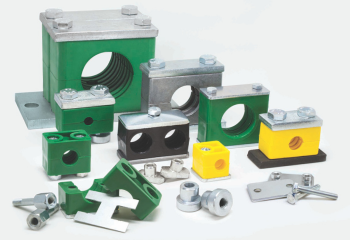
Secure Your System – All You Need to Know About Hydraulic Tube Clamps
Hydraulic pipe clamps also known as hydraulic tube clamps are used to secure, support, and stabilize pipes, hoses, and tubes that carry fluids in hydraulic systems. They're an essential part of managing hydraulic lines, especially in high-pressure environments like construction equipment, manufacturing plants, and industrial machinery.

Hydraulic Tubing vs. Hydraulic Hose: What You Need to Know
Hydraulic tubes are pipes or tubes specifically designed for use in hydraulic systems, which are systems that transmit power through the use of pressurized liquids, typically oil. These tubes are used to carry hydraulic fluid between various components, such as pumps, cylinders, and valves, in machinery and equipment.

Why Gear Pump Connectors Matter: Boosting Efficiency and Reliability
Gear pump connectors are used to connect the pump to the system, ensuring proper fluid flow into and out of the pump. They also help maintain pressure, prevent leaks, and ensure the pump is securely attached to the system.
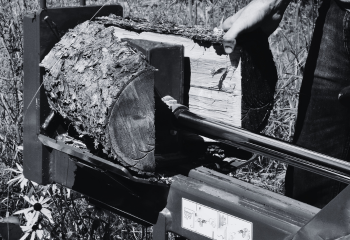
Precision Control: Our Top Log Splitter Valves Explained
Log splitter valves are hydraulic control valves specifically designed for log splitters. They regulate the flow of hydraulic fluid to control the movement of the hydraulic cylinder, which pushes the log against the splitting wedge. These valves are essential for ensuring smooth and efficient operation, allowing users to control the splitting force and cycle speed.
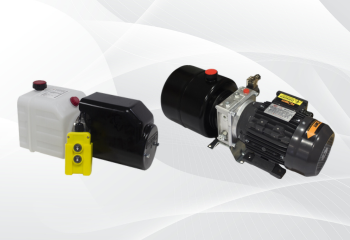
10 Essential Tips for Maintaining Your Hydraulic Power Unit
A hydraulic power unit (HPU) is the heart of many hydraulic systems, powering critical machinery in industries such as construction, manufacturing, and agriculture. Regular maintenance is essential to ensure that the HPU continues to perform at its best, preventing unexpected breakdowns and costly repairs. Neglecting maintenance can lead to diminished performance, increased energy consumption, and even system failure.
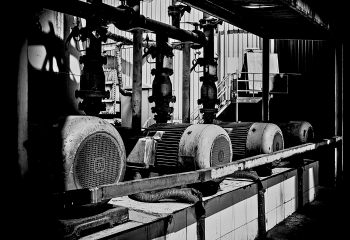
Troubleshooting Electric Motors: 5 Common Problems and Solutions
Electric motors are vital components in many industrial, commercial, and residential applications. However, when they malfunction, it can lead to costly downtime and repairs. This guide outlines the five most common problems with electric motors and provides practical solutions to fix them
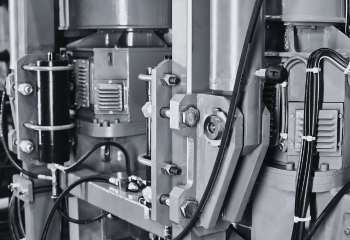
How Do I Stop Oil Leaks and Seal Failures in my Hydraulic System?
This blog will explore the common causes of oil leaks and seal failures in hydraulic systems, which can lead to inefficiency, increased maintenance costs, and environmental hazards. It will provide actionable solutions to prevent, identify, and fix these issues, ensuring the longevity and optimal performance of hydraulic systems.

What Causes Air Contamination and Cavitation in a Hydraulic System?
This blog will dive into the causes of air contamination and cavitation in hydraulic systems—two critical issues that can negatively affect system performance, damage components, and lead to costly downtime. The blog will explain the mechanics of these problems, their impact on hydraulic systems, and provide practical solutions for prevention and troubleshooting.

Top 5 Common Hydraulic Power Unit Problems and How to Solve Them
Hydraulic power units are critical components in various industrial systems, and understanding common problems can help users maintain optimal performance, reduce downtime, and extend the lifespan of their equipment.
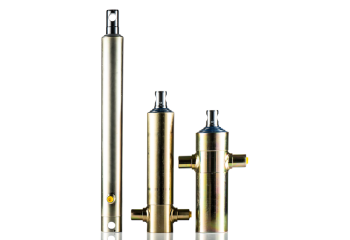
The Power Behind the Lift: Understanding Telescopic Cylinders
Telescopic cylinders are a type of hydraulic cylinder that consist of multiple nested stages or sections, which allow the cylinder to extend to a much greater length than a single-stage cylinder, all while maintaining a compact retracted size. They are often referred to as "telescoping cylinders" due to their ability to extend like a telescope, with each stage sliding into the next.
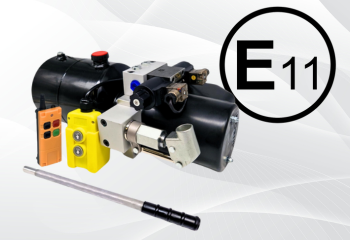
What does E11 Certification entail, and how does it benefit a hydraulic power pack?
The mobile hydraulic sector is subject to various safety and compliance regulations to guarantee safety, efficiency, and dependability. The E Mark signifies ECE certification, confirming that vehicles and their parts comply with the necessary standards for marketability within the European Union.
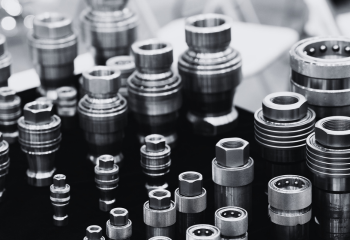
Hydraulic Quick Release Couplings: How They Work and Why They Matter
Hydraulic quick-release couplings are specialized mechanical connectors designed for the efficient and tool-free connection and disconnection of hydraulic fluid lines. They are essential components in hydraulic systems, enabling users to quickly attach or detach hoses, pipes, or other components without the need to drain the hydraulic fluid entirely.

Power and Precision: The Ultimate Trailer Tipper Kits for Every Job
When it comes to hydraulic solutions, Flowfit stands out as a trusted name. Whether you're lifting, tipping, or performing complex operations, our hydraulic systems are designed with durability and efficiency in mind. Among these, Trailer Tipper Assemblies have become an indispensable tool for industries requiring reliable and robust tipping solutions. In this blog, we’ll explore the features, benefits, and applications of Flowfit Trailer Tipper Assemblies and why they are the go-to choice for professionals worldwide.
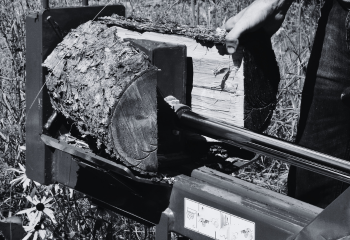
Powerful Precision: Why Hydraulic Cylinders Are a Game-Changer for Log Splitters
A hydraulic log splitter cylinder is a crucial component in a hydraulic log splitter, which is a machine designed to split logs into smaller pieces, typically for firewood. The cylinder is responsible for converting hydraulic pressure into mechanical force, allowing the splitter to effectively drive a splitting wedge through the wood.
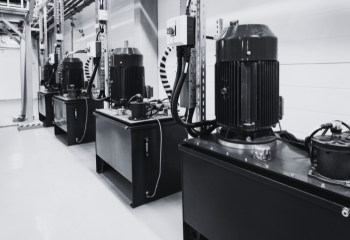
Hydraulic Tank Heaters: Protecting Your Systems in Cold Conditions
A hydraulic tank heater is a device designed to heat the hydraulic fluid within a hydraulic tank. These heaters help maintain the fluid at optimal temperatures, ensuring efficient operation of hydraulic systems, especially in cold environments.
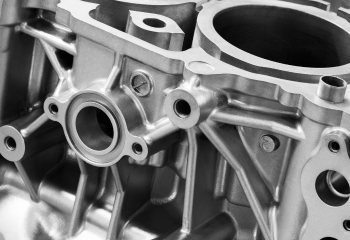
A Seamless Connection: Understanding Bell Housings and Drive Couplings
A petrol engine bell housing is a critical component that serves as a protective enclosure for the engine's rear end, specifically around the transmission and crankshaft. Its primary role is to connect the engine to the transmission while also providing structural support.
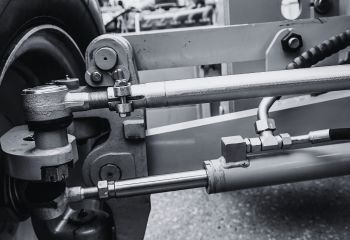
Understanding the Different Types of Bypass Valves and Their Uses
A bypass valve is a component in hydraulic and fluid systems that provides an alternative path for fluid flow, allowing it to bypass certain sections of the system under specific conditions.

Unloading Valves: Your First Line of Defense Against System Failures
The purpose of an unloading valve in a hydraulic system is to regulate and control pressure within the system, primarily to prevent overpressure conditions that could cause damage to hydraulic components.
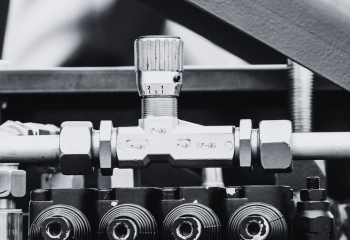
The Importance of Flow Control Valves in Hydraulic Circuit Design
Flow control valves are hydraulic components used to regulate the flow rate of fluid in a system. By controlling the flow rate, these valves help manage the speed of actuators like hydraulic cylinders and motors, ensuring the system operates smoothly and efficiently.
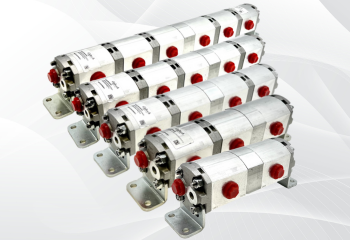
Solving Uneven Flow Distribution with Hydraulic Geared Flow Dividers
A hydraulic geared flow divider is a mechanical device used to divide and distribute the flow of hydraulic fluid evenly between multiple circuits or actuators.
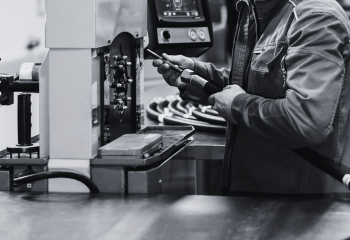
The Importance of Regular Hydraulic Fluid Testing
Neglecting hydraulic fluid testing can lead to several serious consequences that affect both the efficiency and safety of hydraulic systems

Flow Rate vs. Pressure: Understanding the Key Differences in Hydraulic Systems
Flow rate affects speed, while pressure determines the amount of force or power. Both are crucial, and they need to be balanced depending on the application's requirements.

Top Reasons Your Hydraulic System is Overheating
Identifying and addressing these issues is crucial for maintaining optimal hydraulic system performance and preventing damage.

Stay Safe: Top Tips for Operating Hydraulic Tools
By prioritizing hydraulic safety, organizations can create a safer work environment, protect their workforce, and enhance operational efficiency. Discover essential safety tips for using hydraulic tools effectively. Learn best practices to protect yourself and others while operating hydraulic equipment, ensuring a safe and efficient work environment.
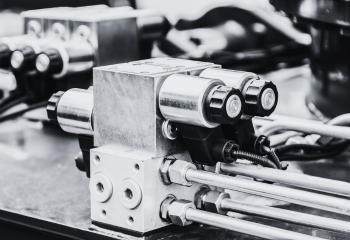
Understanding the Function and Benefits of Solenoid Spool Diverter Valves
A solenoid spool diverter valve works by using an electromagnetic solenoid to shift a spool inside the valve body, directing hydraulic fluid to different pathways within a hydraulic system.
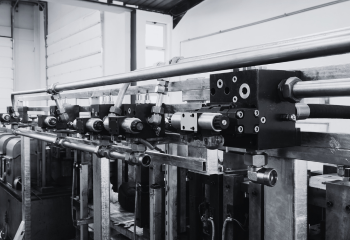
The Role of Cetop Valves in Hydraulic Systems
Hydraulic Cetop valves are a type of hydraulic control valve commonly used in fluid power applications to manage the flow and direction of hydraulic fluids within a system. The term "Cetop" refers to a standard developed by the Centro Italiano di Unificazione Tecnica (CETOP), which defines the dimensional and functional specifications for hydraulic components.
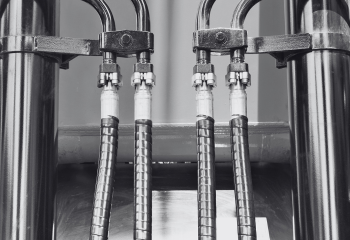
Hydraulic Health: 10 Tips for Effective System Maintenance
By prioritizing the maintenance of your hydraulic system, you not only enhance its performance and reliability but also promote safety, cost efficiency, and environmental responsibility. Checkout our overview of best practices for hydraulic system maintenance:

How much tonnage or force can I get from my log splitter or hydraulic press?
The tonnage or force you can expect from your log splitter or hydraulic press depends on several factors, primarily the hydraulic pressure (measured in PSI or Bar) and the surface area of the piston or ram (measured in square inches or square centimetres).

Troubleshooting Made Easy: 5 Steps for Common Hydraulic Problems
Hydraulic systems are essential in various industries for their efficiency and power. However, like any complex system, they can encounter problems that may hinder performance. This blog will explore common hydraulic system issues, their symptoms, potential causes, and troubleshooting steps to restore optimal functionality
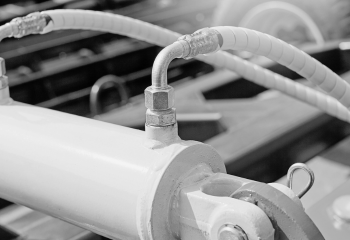
Is the system single-acting, double-acting, or a pressure and return (P+T)?
Knowing which type your hydraulic system is will help you understand its capabilities and limitations for your specific application.

Hydraulic Power Units: Types, Functions, and Benefits
A hydraulic power unit (HPU) is a vital component of hydraulic systems that converts mechanical energy into hydraulic energy, enabling the operation of hydraulic machinery.
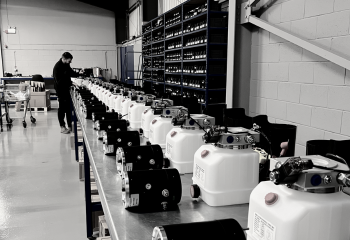
AC vs DC Hydraulic Power Units: What's the Difference?
Hydraulic power units (HPUs) are critical in powering hydraulic systems, but they come in two main types based on their power sources: AC (Alternating Current) and DC (Direct Current).
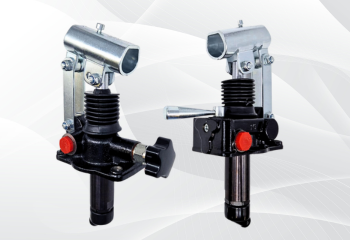
Hydraulic Hand Pumps Explained: How They Work and Why You Need One
A hydraulic hand pump is a mechanical device that uses manual force to generate hydraulic pressure. It is commonly employed in various applications, such as lifting heavy loads, powering hydraulic systems, and performing maintenance tasks
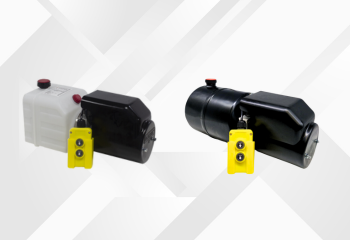
How to Wire a DC Power Unit: A Step-by-Step Guide
Wiring a DC power unit is an essential task in various hydraulic and electrical applications. Whether you're setting up a hydraulic system or powering machinery, knowing how to wire a DC power unit properly is crucial for efficiency, safety, and longevity. In this guide, we’ll walk you through the process of wiring a DC power unit, covering the tools you’ll need, key safety measures, and detailed step-by-step instructions.
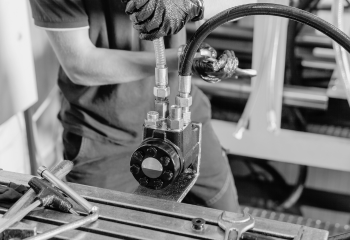
Hydraulic Formulas for Motors and Pumps
Here are the essential hydraulic formulas for motors & pumps to help calculate performance metrics like displacement, torque, speed, and power in hydraulic motor systems

Finding the Perfect Fit: Determining Displacement for Hydraulic Motors
To determine the right displacement for your hydraulic motor, you need to consider several factors that relate to the specific application and performance requirements
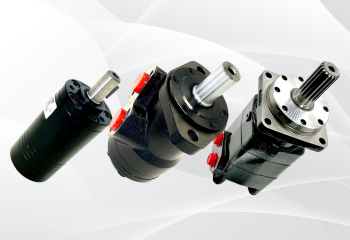
Understanding Low-Speed, High-Torque Orbital Motors: Applications and Benefits
Low-Speed, High-Torque (LSHT) Orbital Motors are specialized hydraulic motors designed to deliver high torque output at low rotational speeds. These motors are commonly used in applications where significant power is needed to drive heavy loads without exceeding high speeds.
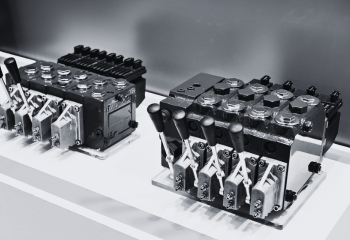
The Function of Directional Control Valves in the Hydraulics Industry
In the world of hydraulics, directional control valves (DCVs) play a crucial role in regulating the flow of hydraulic fluid within a system. They serve as traffic controllers for hydraulic energy, determining the path the fluid takes, controlling its pressure, and dictating whether it moves, stops, or changes direction. These functions are foundational in ensuring the performance, efficiency, and safety of hydraulic systems, which are commonly found in heavy machinery, industrial equipment, automotive systems, and even aviation.
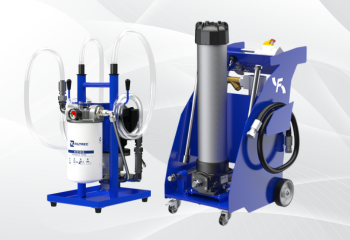
The Essential Guide to Portable Oil Filtration Units: Protecting Your Machinery
Portable oil filtration units are compact, mobile systems designed to filter and purify oil in various settings, particularly in industries where machinery and equipment rely on clean oil for optimal performance.
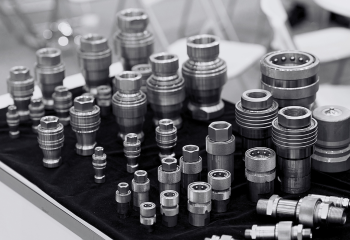
Male Couplings & Female Couplings, What's the difference?
In plumbing, gas, and various industrial applications, couplings play a crucial role in connecting pipes, hoses, and other system components. When working with couplings, you’ll often come across two distinct types: male couplings and female couplings. Understanding the differences between these two is essential for choosing the right fittings and ensuring proper connections. In this blog, we'll break down the differences between male and female couplings, explain how they work, and discuss where they’re commonly used.
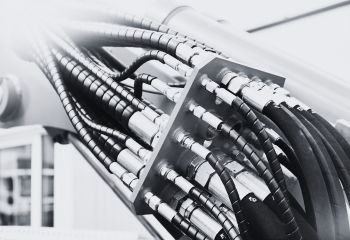
Exploring the Benefits of Custom Hydraulic Hose Assemblies
A hydraulic hose assembly consists of a hydraulic hose, fittings, ferrules, and any other necessary components that connect hydraulic systems to transfer fluid under pressure. Hydraulic hose assemblies are usually manufactured to meet the unique demands of specific applications.
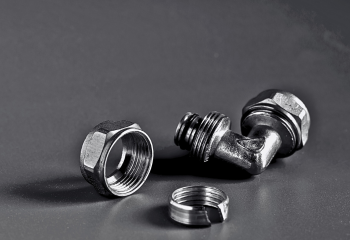
Understanding Compression Fittings: A Comprehensive Guide
Compression fittings are a crucial component in plumbing, gas, and hydraulic systems, allowing for secure, leak-proof connections without the need for welding, soldering, or adhesives. These fittings are widely used in residential, commercial, and industrial applications due to their reliability, ease of installation, and ability to handle a wide range of pressures. In this blog, we'll explore what compression fittings are, how they work, their benefits, common applications, and tips for installation and maintenance.
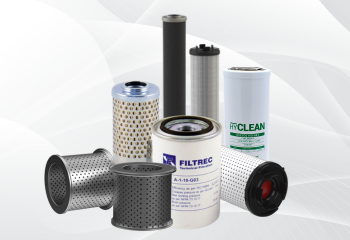
The Ultimate Guide to Filter Elements and How Our Filter Finder Can Help You Choose the Right One
In many industries, from automotive to manufacturing and agriculture, filter elements play a critical role in maintaining the efficiency and longevity of equipment. Filters are essential for keeping harmful particles, debris, and contaminants out of critical systems like engines, hydraulic systems, and air intake mechanisms. Without effective filtration, machinery performance can degrade, leading to costly repairs and downtime. In this blog, we’ll explore what filter elements are, the types available, and how our Filter Finder tool can help you quickly and easily find the right filter for your needs.
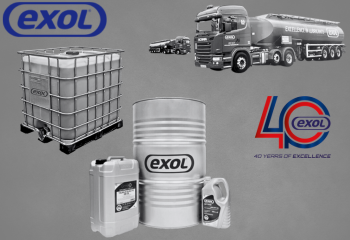
A Comprehensive Guide to Hydraulic Oil: What It Is and Why It’s Essential
Hydraulic oil is one of the most important fluids used in industrial machinery and heavy equipment, yet it often goes unnoticed unless there's a problem. It's the lifeblood of hydraulic systems, ensuring that machinery can perform essential tasks such as lifting, pushing, pulling, and moving with precision and efficiency. Whether you're operating heavy-duty construction machinery, industrial equipment, or even automotive systems, hydraulic oil is essential for smooth, efficient operation. In this blog, we’ll cover the basics of hydraulic oil—what it is, how it works, and why it’s crucial to maintaining the health and performance of your machinery.
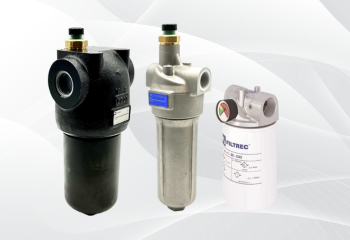
The Importance of In-Line Filtration: Keeping Your Systems Clean and Efficient
In-line filtration refers to the process of filtering fluids as they flow through a system, typically within a pipeline or hose. This filtration method is used in various applications, including hydraulic systems, fuel systems, and water treatment, to remove contaminants such as dirt, debris, and other particles from the fluid. In-line filtration is a crucial aspect of fluid management in various industries, ensuring that systems operate efficiently and reliably by keeping fluids clean and free of harmful contaminants.

The Essential Guide to Gear Oil: What It Is and Why It's Important
Gear oil is a vital component in the smooth functioning of your vehicle’s drivetrain, yet it’s often overlooked compared to engine oil. While engine oil is designed to lubricate the engine, gear oil is specifically formulated to protect the transmission, differential, and transfer cases in your vehicle’s drivetrain. These components face intense pressure and friction daily, making it crucial to understand what gear oil does, how it works, and why regular maintenance is essential. In this blog, we’ll break down everything you need to know about gear oil—its purpose, types, and how to choose the right one for your vehicle.
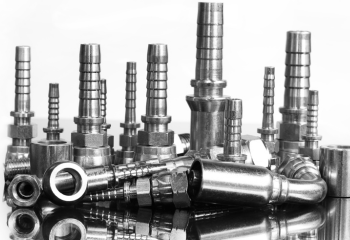
The Ultimate Guide to Hydraulic Hose Fittings: Everything You Need to Know
Hydraulic hose fittings are used to connect hydraulic hoses to various components such as pumps, valves, cylinders, and other hydraulic systems. They provide a secure and leak-proof connection, ensuring the proper flow of hydraulic fluid under high pressure. These fittings are essential in maintaining the efficiency and reliability of hydraulic systems, allowing for the transmission of fluid power in machinery used in industries like construction, agriculture, manufacturing, and transportation. They also help in adapting different thread types, hose sizes, and connection angles for diverse applications.

The Essential Guide to Engine Oil: What You Need to Know
Engine oil is the lifeblood of your vehicle, yet it's one of those things we often overlook until something goes wrong. Whether you're a seasoned car enthusiast or someone who just wants to keep their vehicle running smoothly, understanding engine oil is crucial for maintaining the health and longevity of your engine. In this blog, we’ll explore what engine oil does, the different types, and how to choose the right oil for your vehicle.

Understanding Hydraulic Systems: How They Work and Their Applications
Hydraulic systems are the unsung heroes powering much of our modern machinery. But what exactly are they, and how do they contribute to various industries?

The Ultimate Guide to Chainsaw Oil: Why It’s Essential for Your Chainsaw’s Longevity
When it comes to maintaining a chainsaw, many users focus on sharpening the chain or cleaning out debris, but one of the most crucial factors in extending the life of your tool is often overlooked: chainsaw oil. This specialized lubricant is designed to keep your chainsaw operating smoothly, efficiently, and safely. Whether you’re a professional lumberjack or a weekend warrior trimming trees, using the right chainsaw oil can make a huge difference in performance and longevity.
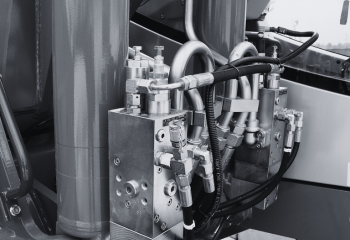
Understanding the Purpose of a Manifold Valve: Key Functions and Applications
A manifold valve is a device used in fluid systems, particularly hydraulic and pneumatic applications, to regulate and direct the flow of liquids or gases. It consists of a block or structure with multiple ports (inlets and outlets) that allow the connection of various valves, instruments, and actuators. Manifold valves consolidate several flow control operations into a single compact unit, making it easier to manage complex flow systems, reduce the need for multiple fittings, and simplify maintenance. Manifold valves are often used in industries such as oil and gas, chemical processing, manufacturing, and any systems where efficient flow control is necessary.
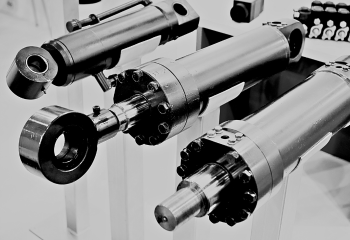
Hydraulic Cylinders in the Maritime Industry: Essential Components for Reliability and Performance
The maritime industry, with its vast range of applications from commercial shipping to offshore oil platforms, faces some of the harshest environmental conditions on the planet. Saltwater corrosion, extreme pressures, fluctuating temperatures, and constant mechanical stress require equipment that can withstand these challenges. Hydraulic cylinders, which play a crucial role in powering a variety of maritime operations, must be robust, reliable, and engineered to endure these demanding conditions.

Understanding the Different Phases of Electric Motors: Single Phase vs. Three Phase
Electric motors are essential components in countless machines and devices, converting electrical energy into mechanical energy. From household appliances to industrial machinery, electric motors power many of the technologies we rely on daily. One of the key aspects of electric motor design is the type of electrical phase the motor uses. The two most common types are single-phase and three-phase motors, each with distinct characteristics and applications. In this blog, we'll explore the differences between single-phase and three-phase electric motors, their working principles, benefits, and typical applications.

The Power of Custom Cylinders: Tailoring Hydraulic Solutions for Every Need
In the world of hydraulic systems, one size does not fit all. Standard hydraulic cylinders, while versatile, often fall short when it comes to meeting the specific demands of unique applications. That’s where custom cylinders step in, providing tailored solutions that are designed to meet exact specifications and deliver optimal performance.
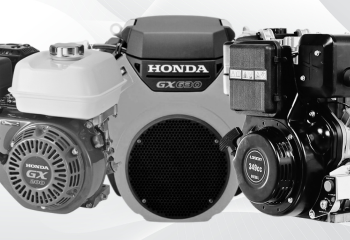
What Is The Difference Between Diesel And Petrol Engines?
They are both internal combustion engines that convert the chemical energy of fuel into mechanical energy. The key distinction between the two lies in their combustion processes
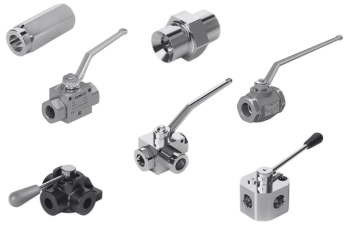
A Comprehensive Guide to Industrial Valves: Types, Functions, and Applications
Industrial valves play a critical role in regulating the flow of liquids, gases, and slurries in various industrial processes. From oil and gas to water treatment, manufacturing, and chemical processing, valves ensure the safe and efficient operation of systems by controlling pressure, flow rate, and direction. With a vast array of designs and mechanisms, understanding the different types of industrial valves can significantly improve system performance and maintenance strategies.
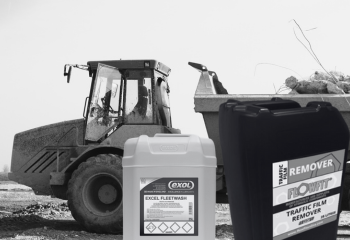
Traffic Film Remover: The Ultimate Cleaning Solution for Vehicles and Machinery
Looking for a quick, safe, and effective way to clean your vehicle or machinery exposed to road grime? Flowfit offers a powerful traffic film remover (TFR) designed to give both your vehicle and equipment a brand-new look without damaging the surface.
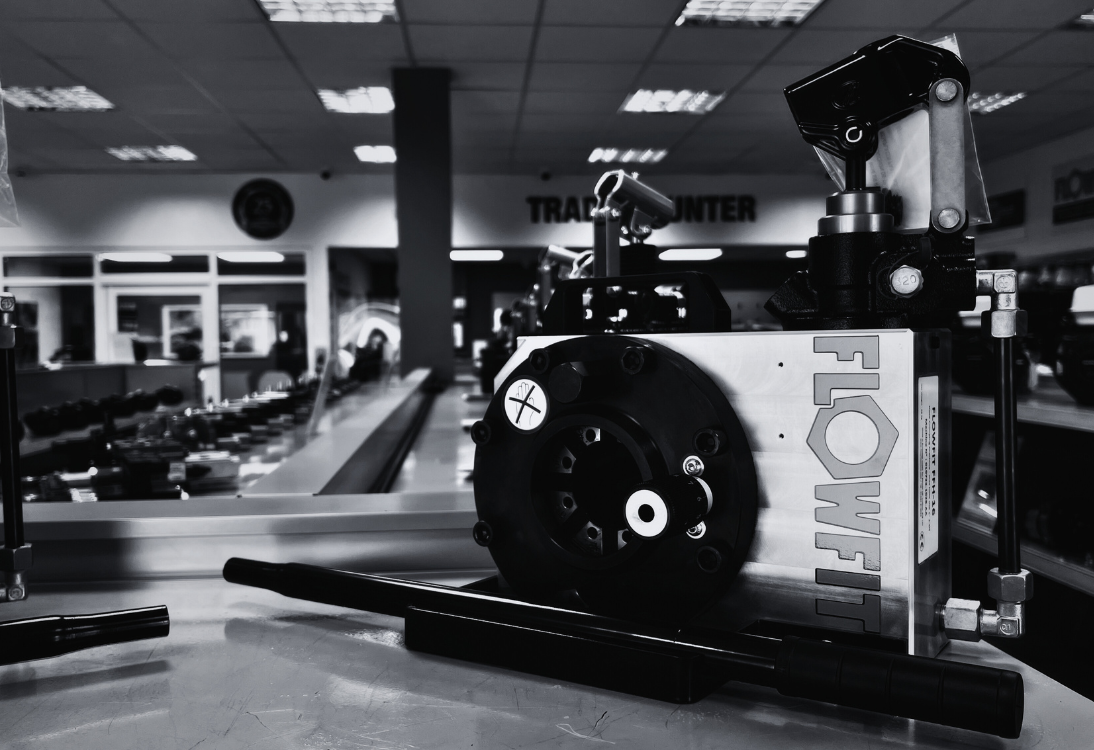
The Ultimate 2024 Guide to Portable Hand-Operated Hose Crimpers
In the world of industrial and DIY applications, hose crimpers are indispensable tools. Whether you're working on hydraulic systems, automotive projects, or home maintenance, a reliable crimper ensures secure and leak-free connections. Among the various types available, portable hand-operated hose crimpers offer a unique blend of convenience, efficiency, and versatility. In this blog post, we’ll explore everything you need to know about these handy tools. We will focus primarily on hydraulic hose crimpers.
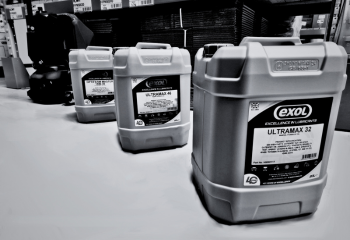
We are proud to announce Flowfit and Exol are working in partnership together.
We are thrilled to announce that Flowfit has joined forces with Exol Lubricants! With nearly seven decades of trading experience, both Flowfit and Exol have been pioneers in their respective markets on a global scale. This collaboration is a natural fit, combining Flowfit's commitment to quality with Exol's reputation as a leading supplier of premium lubricants.

Hydraulic Engine Driven Power Units: Versatile Solutions for Remote Work Sites
Engine-driven hydraulic power units provide a versatile, portable, and powerful solution for generating hydraulic power in a variety of settings. Their independence from electrical power sources, high power output, ease of refueling, and robust performance make them an invaluable asset across numerous industries and applications.

What are the most common types of hydraulic components?
In the dynamic world of hydraulic systems, a symphony of components works in harmony to transmit power, control movements, and ensure efficient operations.

What are some common problems that can occur in a hydraulic system
Hydraulic systems are the beating heart of countless industries, powering everything from heavy machinery to precision tools. Yet, like any complex system, hydraulic systems can encounter issues that disrupt their efficiency and functionality.

What are the most common types of hydraulic fluids?
In the intricate world of hydraulic systems, choosing the right hydraulic fluid is a critical decision. Hydraulic fluids serve as the lifeblood of these systems, transmitting power, lubricating components, and ensuring efficient operation.

How to Service Your Hydraulic System
A well-maintained hydraulic system is the cornerstone of efficient and reliable operations. Regular servicing ensures longevity, minimises downtime, and maximises performance.

5 Ways to Save Energy with Your Hydraulic System
In an era focused on sustainability and efficiency, optimising energy consumption is a universal goal. Hydraulic systems, integral to various industries, offer an opportunity to make a significant impact on energy conservation.

What does P and T stand for in hydraulics?
Hydraulics is a realm of engineering that operates on a unique language of symbols and terms. If you're new to the world of hydraulics, you might come across abbreviations and symbols that can seem like hieroglyphics at first.

How to work safely with machinery
In a world powered by machinery and automation, working safely is paramount. Whether you're a seasoned professional or a novice, understanding how to operate machinery without compromising your well-being is essential.

5 Mistakes That People Make When Building a Hydraulic System
Building a hydraulic system is a complex endeavour that requires meticulous planning, technical expertise, and attention to detail. From engineering marvels to everyday machinery, hydraulic systems serve as the backbone of countless applications.

What does the future hold for hydraulics?
In a rapidly evolving technological landscape, industries are constantly seeking ways to enhance efficiency, productivity, and sustainability. Among the cornerstones of industrial operations, hydraulics stands tall as a versatile and powerful force.

Why Do You Need A Hydraulic Oil Cooler?
Hydraulic equipment is vital for any machinery. They allow for precision control and safe operation of industrial machines, keeping production lines running smoothly.

How To Replace A Hydraulic Hose?
Every hydraulic system has mechanisms that require hydraulic hoses to make them functional, however over time these hoses begin to deteriorate, leak and stop working. Replacing these hoses before this happens is the best way to ensure your hydraulic system continues working efficiently.

What Is The Difference Between A Single And Double Acting Cylinder?
There are several sections you can look at within hydraulic cylinders that would allow you to tell them apart. We’re here to help you figure out which is which and get the most out of your components.

What Can I Use A Hydraulic System From Flowfit For?
Hydraulic systems use pressurised fluid, oil and water to create repetitive movements that are efficient, cost-effective and versatile. They have a wide variety of applications, with the most common being in large industrial settings such as; construction, logging, manufacturing and robotics industries.

Hydraulic Pump Cavitation: Causes & Symptoms
avitation is the second leading hydraulic pump failure cause, behind contamination. As this can potentially cause damage and compromise your hydraulic system, it is important to understand what it is as well as its symptoms.

What Are Important Things You Should Know About Hydraulic Motors?
his section within a hydraulic system is a rotary actuator that converts hydraulic fluid energy into mechanical power.

The Simple Design Of Hydraulic Cylinders
Where you’ll find large scale, or even smaller sized, mechanical equipment, chances are you’re also going to find hydraulic cylinders.

How To Choose A Hydraulic Log Splitter
Anyone who has been manually chopping up wood with an axe will realise how labour intensive it is. Necessity is the mother of invention and, in this case, the answer was the hydraulic log splitter

The Basics Of Hydraulic Power Packs
A hydraulic power pack is an important part of many hydraulic systems, from small scale engineering through to aerospace projects and beyond.

Mistakes To Avoid When You Need Hydraulic Rams Repairing
Due to the nature of the design of any machine that uses moving parts, there will inevitably be times where replacements or repairs are needed. This is true of many hydraulic components including hydraulic rams.

Make Your Hydraulic Oil Last Longer
While we’re currently enjoying a time of low oil prices, for the first time in what seems like an age, it can still prove costly if you’re running a lot of hydraulic equipment to replace the fluid within.

The Different Types Of Hydraulic Motor
Picking out the perfect Hydraulic Motor can seem daunting, particularly with all the technical specifications attached to each and every model.

What Is A Hydraulic Check Valve, And Why Do You Need One?
Here at Flowfit, we are proud to say that every one of the Hydraulic Check Valves we offer has been engineered to provide a long-lasting and unbeatable performance

What Are The Industrial Applications For Hydraulic Cylinders?
Many contemporary industries rely heavily on large, automated systems and complex machines to ensure their continued efficiency.

The Different Types Of Hydraulic Cartridge Valve, And Why They Are So Essential!
Hydraulic Cartridge Valves are valves used in Hydraulic systems and machines. They are used for directional, pressure and flow control in many industries.

How To Choose The Right Hydraulic Pump For You!
Here at Flowfit , we stock a wide range of hydraulic pumps to meet your every need.

What Are Hydraulic Pumps And How Do They Work?
Here at Flowfit, we stock a range of hydraulic products for your every need. Working closely with our suppliers and manufacturers, we are able to offer our customers the latest, and only the very best, hydraulic products.

The Different Designs Of Hydraulic Check Valve
An integral component for hydraulic system control, hydraulic check valves come in a wide range of sizes, shapes and designs.

What Are The Practical Applications Of Hydraulic Log Splitters?
With the rising costs of domestic heating gas oil, a national desire for alternative fuel and heating sources has been awakened.

Weird And Wonderful Industrial Uses For Hydraulic Cylinders!
Hydraulic systems are one of the most popular designs of system around, particularly for high-powered industrial machines.

Hydraulic Log-Splitters - Electric Vs. Gas-Powered
Hydraulic Log-Splitters are the most effective way of splitting logs, but when you come to choose one, you are likely to be caught up in the great Electrical/Gas-Powered war that rages across the internet and even amongst industry professionals themselves.

The Modern Applications Of Hydraulic Cartridge Valves
Valves are essential components of any hydraulic system – check valves are mono-directional valves which feature a variety of uses within the hydraulic system.

Pneumatic or Hydraulic Motors Whats The Difference?
For many years, the arguments have been raging between which is the best kind of linear actuator, a pneumatic or hydraulic motor. Each one of these designs basically fulfils the same function, so what’s the difference?

Check Out These 3 Ways To Make Your Garden-Work Easier
Summer is already flying past and, before you know it, it will be Autumn again. It’s time to start seriously considering your yearly garden maintenance, and maybe even draw up a to-do list for both Summer and Autumn.

The 4 Dangers Of Choosing The Wrong Hydraulic Cylinders
As a general product group, hydraulic cylinders are one of the most common system components in the world; almost as common as hydraulic pumps and motors combined!

Clean Wood Burners And Hydraulic Log Splitters
The US Environmental Protection Agency has gathered a lot of heat recently (pun intended) as their latest regulations have resulted in around 80% of existing wood-burning stoves to be banned.

Just How Clean Is Your Hydraulic Fluid?
Whilst there are dozens of oil-lubricated assets to be found in a wide range of locations, including industrial sites, hydraulic systems are certainly the most vulnerable to contamination.

Keep Your Hydraulic System Free Of Contaminants!
Ensuring that your hydraulic system is kept free of contamination is essential to ensure its reliable and long-lasting service.

Electric Or Hydraulic Motors Whats The Difference?
The arguments between two of the most popular designs of linear actuators have been raging for many years and it doesn’t look like there will be any resolution any time soon.

What Is A Hydraulic Press, And How Are They Used?
A hydraulic press is a machine that has a bed or plate, within which an item (usually composed of metal) is placed so that it can be easily crushed, straightened or moulded.

Get Ready For Autumn, With A Hydraulic Log Splitter
To many of us, it might seem like summer has only just begun, but autumn is certainly on its way. Before too long, the leaves will be turning brown, the nights will start to lengthen and the dreaded autumn rains will start to batter at our roofs.

Do You Know What The Primary Hydraulic Fluid Contaminants Are?
Making sure that your hydraulic system remains free and clear of contaminants is essential to ensuring the reliability and longevity of your system as a whole.

Hydraulic Cylinders And Their Use In Tool Design
Hydraulic cylinders are used in a huge range of industries and for a wide variety of purposes. One of their most common roles is in injection moulding tooling, which includes the production of slides, core pulls, ejection and reverse ejection, gas-assisted overflows and valve pins, amongst a thousand other components.

Hydraulic Pump Classification
When a hydraulic pump goes into operation, it performs to key functions.

A Brief Overview Of The Different Types Of Hydraulic Motors
Hydraulic motors are a key component of any hydrostatic power transmission system.

The Worlds First Dedicated Hydraulic Trade Store (That We Know Of)!
Here at Flowfit, we are extremely proud to say that, back in February 2013, we opened the world’s first fully-dedicated hydraulic components and systems trade shop. We offer a diverse range of products and complete units to ensure that you can find just what you’re looking for.

Reliable Vehicle Hydraulic PTO & Hydraulic Pump Kits
When it comes to maintaining your commercial or 4x4 vehicle, it is absolutely essential that you only use the very best components.

What Are Hydraulic Cartridge Valves, And How Do They Work?
Hydraulic cartridge valves, sometimes known as slip-in valves, 2/2-way valves or logic valves, are extremely important for all kinds of hydraulic systems in a wide range of industries.

3 Common Symptoms Of Hydraulic Gear Pump Problems
Making sure that you keep your hydraulic system operating as it should requires proactive maintenance. This means that you need to keep an eye on your entire system’s operation, but also the individual components that makes this up.

What Are Directional Control Valves, And Why Do You Need One?
Directional control valves are used to control the direction and movement of hydraulic fluid through a system.

Avoiding Damage To Hydraulic Motors From Temperature Shock
For the most part, hydraulic motors are extremely reliable components that are designed to last for a long time and are resistant to many kinds of wear and tear.

4 Ways To Reduce The Cost Of Hydraulic Cylinder Failure And Repair!
As they are essential for any and all hydraulic systems, it isn’t really a surprised that hydraulic cylinders are also one of the most costly things to repair.

Detecting And Repairing A Faulty Hydraulic Lifter!
In a car’s engine, a hydraulic lifter uses oil pressure to adjust a plunger and works to take up all the clearance within the main valve train. Not only will this work to create less engine noise, it will also provide longer levels of reliability as a result of less wear and tear.

How Do Hydraulic Ram Pumps Work?
Hydraulic ram pumps are some of the most common pumps in the world. Thanks to their simplicity, they are particularly common solutions when it comes to providing clean water to deprived areas of the world.

Hydraulic Motor Dry-Starts And How You Can Prevent Them!
In the past, we’ve dealt with a range of hydraulic motors issues, but one of the most common is as the result of dry-starting the system. Dry-starts can cause hydraulic equipment to fail far shy of their predicted service life.

Preventing Leakage From Your Hydraulic Systems!
Leakages in hydraulic systems are an irritating, costly issue which hydraulic operators have had to live with for many years.

What Makes The Best Firewood?
Whether you’re looking for a glowing fireplace or blazing flames to warm up your home, you need to understand the role that your choice of wood can play in your resulting fire.

What Are Hydraulic Power Packs, And Why Are They Essential?
Simply, hydraulic power packs are self-contained units that are used in place of an integrated power supply for hydraulic machinery.

The Basics Of Different Hydraulic Pumps For Fluid Motion
As one of the most important parts of any hydraulic system, hydraulic pumps are the components which actually transform energy and kinetic motion in hydraulic fluid motion and pressure.

Hydraulic Gear Pumps - And How They Work?
Hydraulic gear pumps are one of the most essential components in any kind of hydraulic set up. Without these essential components, hydraulic power would be impossible.

5 Ways You Wear Out Your Hydraulic Components!
From the very moment that they are first installed into a hydraulic system and the hydraulic fluid starts to pass through them, your components will start to die out. They will be worn down all through their life due to the high intensity of hydraulic solutions.

Dealing With Water In Your Hydraulic Oil
If your hydraulic system is being fed with oil that looks cloudy, then you’ll no doubt have found that the entire system is much less efficient and much quicker to break down.

Everything You Need To Know About Pilot-Controlled Hydraulic Cartridge Valves
Hydraulic cartridge valves are an essential component of most hydraulic systems. Without these pilot-controlled valves, it would be practically impossible to control the flow of hydraulic fluid through a system with anywhere near the reliability and speed that these systems demand.

Hydraulic Control Valves Set The Course For Hydraulic Systems
Hydraulic control valves are one of the smallest, and yet most essential components of any hydraulic system. That includes any kind of domestic or industrial system that you might have worked with in the past.

Hydraulic Rams At The Movies!
When it comes to your favourite movie, the chances are you’ll be able to name the director, the starring actors, your favourite scenes and even a little background information and trivia. However, one thing that everyone seems to forget is that a lot of the most famous scenes wouldn’t have been possible without hydraulic rams and complete hydraulic systems.

The Features Of Bespoke Hydraulic Cylinders From Flowfit
As well as our comprehensive range of hydraulic cylinders – designed to fit a wide range of hydraulic systems – we are also able to create models with unique specifications.

Hydraulic Motor Essentials
Understanding the basics of your hydraulic motor is absolutely essential when it comes to making the most of your hydraulic system.

Keep Your System Working With Hydraulic Control Valve Maintenance
Your hydraulic system can’t work without a range of different components. Some of the most essential parts of your system include your hydraulic control valves.

Flowfit To Present Swaging Machines At The Royal Welsh Show
At Flowfit, we love to stay ahead of the hydraulics world. We are constantly working to provide the highest quality components for all kinds of hydraulic systems.

The Filter Cart 'Rule of Seven'
Off-line filtration, whether permanently installed on a hydraulic system, or effected by the temporary installation of a portable filter cart, is a powerful tool in the contamination control effort.

What magazine should I subscribe to in 2018? Series 1: Construction Magazines
With Christmas just around the corner, it's time to start thinking about what gifts to get for friends and family. A subscription to a favourite magazine may be the perfect idea. Flowfit has researched a series of different types of magazines to help you decide which magazine subscription to sign up for on based on how popular they are on Google.

What magazine should I subscribe to in 2018? Series 2: Tractor Magazines
In the 2nd installment of what magazine to subscribe to in 2018, we look at tractor magazines. Whether you’re a John Deere devotee or a Ford and Fordson fan, tractor magazines provide useful information for all kinds of tractor enthusiasts – young and old!

What Magazine Should I Subscribe To In 2018? Series 3: Farming Magazines
In the 3rd and final instalment of what magazine to subscribe to in 2018, we look at farming magazines. If you’re a farmer or know someone who is, it is important to stay up to date with what’s going on in the industry.

Want to know more about Hydraulic AC Power Units?
Firstly, let’s start by introducing the Hydraulic Power Unit. Hydraulic Power Units are the main driving component of any hydraulic system and are a lot more powerful than people initially think.

What Are The Benefits Of A Hydraulic Tank
A Hydraulic Tank which is also commonly known as a reservoir are essential when it comes to storing your hydraulic fluid.

Why Hydraulic Cartridge Valves are essential to all Hydraulic systems?
Often used in Hydraulic systems and machines, Hydraulic Cartridge Valves are mostly used for directional, pressure and flow control in many industries.

What Causes A Hydraulic System Failure?
Hydraulic systems of all shapes and sizes can fail. This may not happen very often, however most of the reasons for these failures can be prevented with the right care and checks.

Do You Know How To Use A Hydraulic Hose Crimping Machine?
If you are assembling your own hydraulic hoses in your workshop or for onsite repairs then you may be in need of a hydraulic hose crimping machine that allows you to crimp your own fittings yourself.

Keep your Hydraulic Solenoid from failing!
Hydraulic system components such as Cetop Solenoid Valves are used to form a hydraulic circuit. These are common components and are often used in hydraulic powerpacks and standalone hydraulic manifold blocks.

Working Out The CC Measurement Of A Hydraulic Gear Pump
When it comes to using hydraulic gear pumps it is important to make sure that you have accurate measurements of all parts of the pump, especially the cc.

Calculate The Power Required To Generate Hydraulic Pump Flow
he role of a hydraulic pump is to provide sufficient pressure to overcome the operating pressure of a system to move hydraulic fluid at a required pump flow rate.

The Two Main Types of Log Splitters
As we head further into the winter months, those of us with open fires will be thinking more about getting these fires lit. There is nothing better than spending a cold, crisp winter evening huddled under a blanket with a homely warm fire burning in the hearth.

Common Log Splitter Problems And What To Do When They Appear
Hydraulic Log Splitter systems use pressurised fluid to power a force that is used behind a wedge to split wood. If the log splitter seems weak or not performing as it should then there is a strong likelihood that something is not right with how the splitter system is operating.

What Are Directional Control Valves & How Do We Use Them?
Directional control valves are used to control hydraulic oil flow into different paths from one or more sources, ensuring that they follow a specific path.

Which Oil Can Be Used Within Hydraulic Systems?
To ensure the smooth running of any hydraulic system the correct hydraulic oil needs to be present.

Why Is It Important To Have An Emergency Spill Kit?
For any business workspace, when there is the risk of harmful liquids spilling and causing potential harm, having an accessible spill kit to hand is a must.

Why you should keep all of your hydraulic equipment up to date
When using hydraulic equipment, one of the most important things to remember is to regularly check your equipment for wear and tear to keep those using the machinery safe and to keep the cost of repairs as low as possible.

Why You Should Consider A Diesel Hydraulic Power Unit
Hydraulic power units are systems that use enclosed fluid to transfer energy from one sauce to another to drive components of a hydraulic system.
The total one-stop supplier for hydraulic components & systems
Get in touch
find us
Parys Road
Ludlow
Shropshire
SY8 1XY
CALL US
EMAIL US








